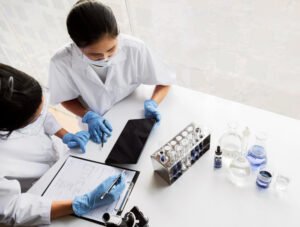Overview
Coughing up blood, medically known as hemoptysis, is a symptom where blood is expelled from the respiratory tract through coughing. The amount can range from small streaks in sputum to significant bleeding. While minor cases may be benign, persistent or large-volume hemoptysis can indicate serious underlying conditions such as infections, lung disease, or cardiovascular issues. In Korea, hospitals and clinics offer advanced diagnostics, treatment, and specialized care for patients experiencing hemoptysis, ensuring prompt intervention to prevent complications.
Key Facts
▶ Prevalence: Can occur at any age; higher risk in individuals with lung disease, smokers, or those with immune compromise.
▶ Causes: Respiratory infections, chronic bronchitis, tuberculosis, lung cancer, pulmonary embolism, or trauma.
▶ Associated Symptoms: Shortness of breath, chest pain, fever, weight loss, fatigue, or persistent cough.
▶ Treatment Options in Korea: Medical therapy, interventional pulmonology, surgery, and supportive care.
▶ Urgency: Severe or sudden hemoptysis is a medical emergency.
What is Coughing Up Blood?
Coughing up blood is a symptom, not a disease, indicating bleeding somewhere in the respiratory tract—from the trachea, bronchi, or lungs.
▶ Mild Hemoptysis: Small blood streaks mixed with mucus, often from irritation or infection.
▶ Moderate Hemoptysis: Noticeable blood in sputum, may indicate bronchitis, pneumonia, or minor lung injury.
▶ Massive Hemoptysis: Large-volume bleeding, potentially life-threatening, usually from major airway or vascular lesions.
▶ Associated Conditions: Tuberculosis, lung abscess, pulmonary embolism, or lung cancer.
Note: Identifying the source and cause is critical for effective management and to prevent complications.
What Symptoms Are Related to Coughing Up Blood?
▶ Blood in Sputum: Bright red or rusty-colored blood expelled during coughing.
▶ Persistent Cough: Chronic or severe cough accompanying bleeding.
▶ Shortness of Breath: Difficulty breathing due to airway obstruction or underlying lung disease.
▶ Chest Pain: May accompany infections or pulmonary embolism.
▶ Fever and Chills: Suggests infectious causes like pneumonia or tuberculosis.
▶ Fatigue or Weakness: From blood loss or chronic illness.
▶ Unintentional Weight Loss: Often seen in chronic infections or malignancy.
▶ Night Sweats: Frequently associated with tuberculosis or systemic infections.
What Causes / Possible Causes
Hemoptysis can result from infectious, inflammatory, structural, or vascular causes:
▶ Respiratory Infections: Pneumonia, bronchitis, tuberculosis, or fungal infections.
▶ Chronic Lung Disease: Chronic bronchitis, bronchiectasis, or cystic fibrosis.
▶ Lung Cancer: Tumors eroding into blood vessels in the respiratory tract.
▶ Pulmonary Embolism: Blood clots in lungs causing vascular injury.
▶ Trauma: Chest injury or invasive procedures.
▶ Cardiovascular Conditions: Mitral stenosis or pulmonary hypertension leading to lung vessel rupture.
▶ Autoimmune or Inflammatory Disorders: Vasculitis or Goodpasture’s syndrome.
▶ Iatrogenic Causes: Complications from bronchoscopy, intubation, or surgery.
Note: Hemoptysis can be life-threatening, especially in large-volume cases, requiring immediate evaluation.
When Should I See a Doctor?
▶ Any Episode of Hemoptysis: Even small amounts should be evaluated, particularly in adults.
▶ Massive Bleeding: Immediate emergency care is necessary.
▶ Persistent Cough with Blood: Lasting more than a week without improvement.
▶ Associated Symptoms: Fever, chest pain, weight loss, or night sweats.
▶ Underlying Conditions: Known lung disease, heart disease, or immunocompromised status.
▶ Children and Elderly: Prompt evaluation to prevent complications.
▶ Risk Factors: Smoking, occupational exposure, or recent travel to areas with high tuberculosis prevalence.
Tip: In Korea, specialized pulmonology and thoracic surgery units are equipped to provide rapid evaluation, imaging, and treatment for hemoptysis.
Care and Treatment
Management depends on cause, severity, and risk of complications:
▶ Stabilization: Ensure airway patency, oxygen supplementation, and monitoring vital signs.
▶ Medical Therapy: Antibiotics for infections, anticoagulant adjustment, or anti-inflammatory medications.
▶ Control of Bleeding: Bronchoscopic interventions to identify and stop bleeding.
▶ Surgical Intervention: Resection of affected lung tissue in severe or localized bleeding.
▶ Supportive Care: Hydration, rest, and monitoring for recurrence.
▶ Lifestyle Adjustments: Smoking cessation, avoidance of lung irritants, and adherence to medical therapy.
▶ Follow-Up: Regular monitoring and imaging to ensure resolution and prevent recurrence.
Treatment Options in Korea
Medical Evaluation:
▶ Pulmonology Consultation: Detailed assessment of airway and lung health.
▶ Imaging Studies: Chest X-ray, CT scan, or MRI to locate bleeding source.
▶ Laboratory Tests: Blood count, coagulation profile, sputum culture, or tuberculosis testing.
▶ Bronchoscopy: Direct visualization of airway and treatment of bleeding lesions.
▶ Cardiovascular Assessment: For conditions contributing to pulmonary bleeding.
Advanced Therapies:
▶ Interventional Pulmonology: Endobronchial techniques like cauterization or embolization.
▶ Surgical Resection: Removal of tumor, infected, or damaged lung tissue in severe cases.
▶ Targeted Medications: Antibiotics, anticoagulation adjustments, or immunosuppressive therapy.
▶ Rehabilitation & Support: Pulmonary rehabilitation, oxygen therapy, and patient education.
Outcome: With prompt evaluation and treatment in Korea, hemoptysis can be managed effectively, preventing serious complications, controlling underlying disease, and improving overall lung function and quality of life.













